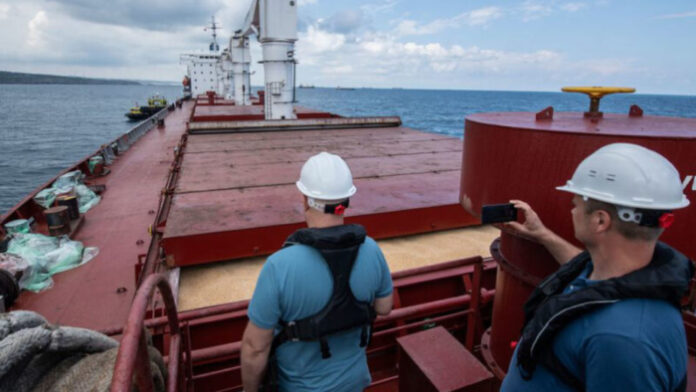
-
UNCTAD Secretary-General Rebeca Grynspan calls for renewal of Black Sea Grain Initiative that expires in November
-
As of October 14, a total of 334 vessels had carried 7.5 million metric tons of Ukraine grain and seeds to various countries
-
Grynspan said combined effects of COVID-19, climate emergency and Ukraine war have sped up a global cost-of-living crisis that may cause millions worldwide hunger and poverty
UNCTAD Secretary-General Rebeca Grynspan has called for a renewal of the Black Sea Grain Initiative that resumed Ukrainian grain and Russian food and fertilizer exports in August through a Russian naval blockade this year.
Grynspan made the appeal as she said the perfect storm of crises hitting the world today has strong trade dimensions that require trade solutions to respond to the challenges.
“The opening of the Black Sea grain corridor, as well as the effort to bring food and fertilizers from Russia to the global markets, has presided over a six-month consecutive decline in the FAO Food Price Index,” Grynspan said at the opening of an UNCTAD side event at the 77th session of the UN Economic and Financial Committee in New York on October 13.
The agreement, brokered by the UN and Turkey with Russia and Ukraine, allows passage of vessels laden with grain and seeds through a narrow corridor on the Black Sea to Turkey for delivery to starving people in Africa and other regions.
The pact will expire in November and talks on its extension have not been convened. Failure to extend the initiative will halt the supply of food to recipients, aggravating a food crisis in parts of Africa and other continents.
As of October 14, a total of 334 voyages have carried 7,448,204 metric tons of grains and other foodstuffs from Ukrainian ports, the Black Sea Grain Initiative Joint Coordination Centre said.
Grynspan said the initiative’s effect began before it was signed, because of the expectation that it would be signed. “In a context where trade is very uncertain, signals matter very much,” she said.
Since every percentage increase in the price of food can push 10 million people into poverty – according to World Bank estimates – “the initiative has had a tremendous welfare effect,” she said.
“By unblocking just one trade route, we have avoided over a hundred million people from falling into poverty,” Grynspan said. “The private sector is anxious about the looming deadline. When there is no clarity, no one knows what is going to happen, and speculation and hoarding take over.”
Meanwhile, Grynspan said the combined effects of the COVID-19 pandemic, the climate emergency and the war in Ukraine have accelerated a global cost-of-living crisis that could plunge tens of millions more people across the world into hunger and poverty this year.
Rising trade costs, especially in maritime transport, have contributed to soaring food and energy prices, which have hit record levels this year.
UNCTAD research shows, for example, that logistics costs alone accounted for at least half of the rise in food prices witnessed at the beginning of 2022.
Trade restrictions, which now cover about 10% of all calories traded worldwide, have limited global supplies. And since Europe now has to import gas on ships instead of through pipes, changes in trade are also affecting the natural gas market.
“If the problem has a trade dimension, then the solution must also have a trade dimension,” Grynspan said. She said the gas example highlights how trade logistics are struggling to keep up with shifts in geopolitics.
“It takes a day for a gas pipeline to stop flowing. But it takes much longer to build a replacement, be it in the form of LNG terminals, LNG ships, or new secondary pipelines,” she said, adding that the same is true for any trade route and commodity. “Value chains are like a forest. They can be destroyed in minutes but take longer to grow.”




